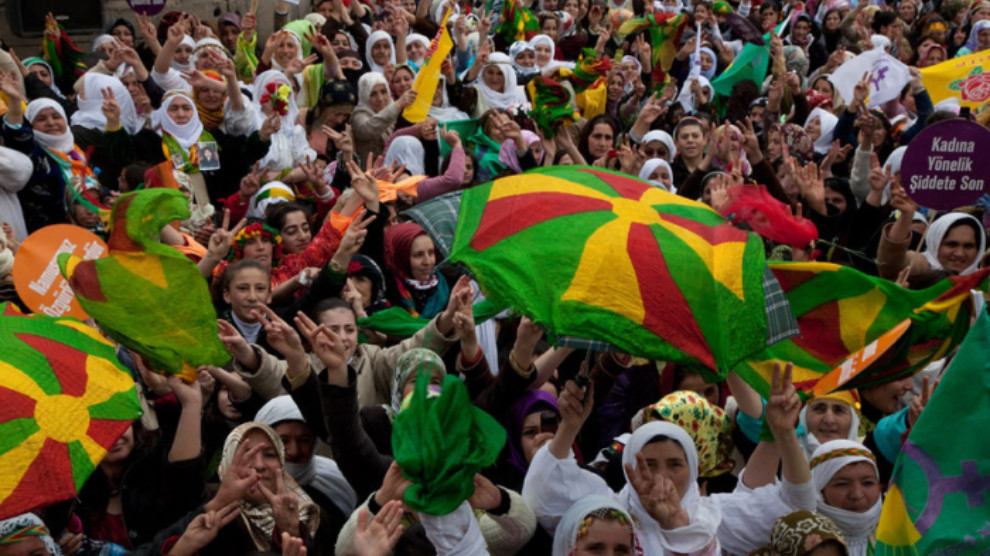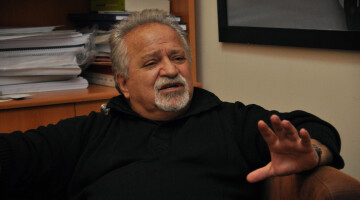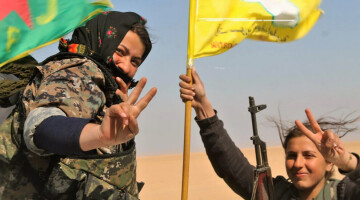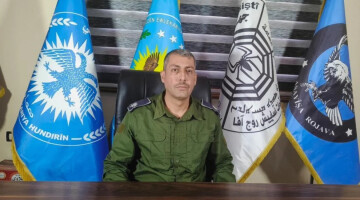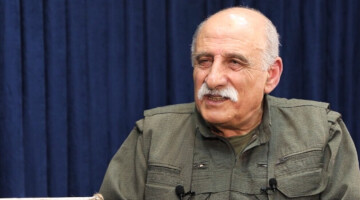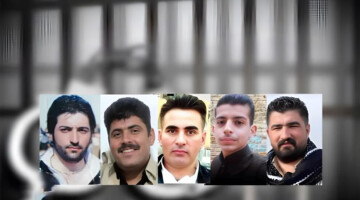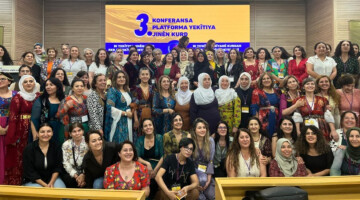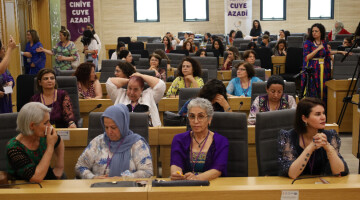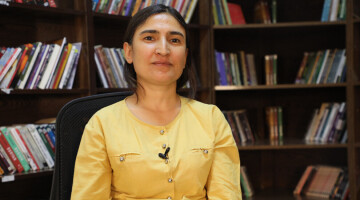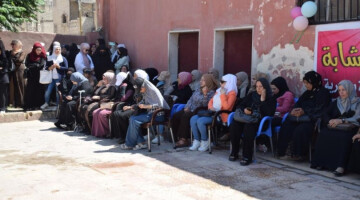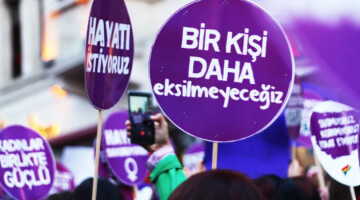Women Defend Rojava Campaign Committee released a statement a statement on the Turkish military offensive seeking to invade North and East Syria.
The statement includes the following;
“On 9 Oct 2019 the Turkish state started its invasion and occupation war on the territory of Northern Syria. The Turkish army has been attacking all major towns and settlements along the border with airstrikes and mortar shelling. According to figures published by the Kurdish Red Crescent during only the first five days of the at- tacks at least 46 civilians were killed and 139 wounded – including many women and children. At present the Turkish army together with a so-called ‘National Syrian Army’ composed of mercenaries from different terror groups are attempting to invade on the ground. At the same time ISIS sleeper cells have started new attacks across North Syria. SDF and YPJ-YPG forces that liberated North and East Syria from the IS terror regime, are dedicating their lives to protect the people from new occupation and massacres. Women who liberated thou- sands of women from slavery under IS are now bombed by a NATO army.
Millions of people’s lives from all different ethnic and religious communities in this region are under threat. Tens of thousands of families have been displaced. Beside mainly Kurdish and Arabic populated villages, Christian neighborhoods have been specifically targeted. It is obvious that these attacks are carried out with the aim of ethnic cleansing and demographic change. Turkish occupation and war crimes in Afrin starting in January 2018 have been condoned by the international community until today. Therefore, Turkey now strives to expand its territory and impose its rule on further regions of North and East Syria, breaching international law and the sovereignty of Syria.
At the same time Turkey neglects the will of the peoples in the region that have been living peacefully together under democratic self-administration. Turkey’s attacks are directed against the gains of the women’s revolution in Rojava that has been a source of inspiration for women from all over the world. Women who have been a vanguard in building up an alternative social model of democratic, ecological society which is based on women’s liberation are targeted by jihadist killer teams. The co-chair of the Syria Future Party Hevrin Xelef was assassinated in an ambush on 12 Oct. when she was on her way to visit injured and displaced people in the Til Temir region. Despite 8 years of continuing war in Syria, the regions of the Autonomous Administration in North and East Syria has succeeded in ensuring human needs and democratic rights for all people in this region. Hundreds of thousands of war refugees from different regions of Syria found refuge here. Without any noteworthy support of UN organisations these refugees have been welcomed, protected and supported by the structures of the Autonomous Administration.
While the Erdogan government openly announced this war and his occupation plans, the international community – including UN bodies – did not take any adequate measure to stop this from happening. Furthermore, hegemonic powers like Russia and the US encouraged Turkey’s aggression. The genocides of the Ottoman Empire against the Armenians and Syriac people in 1915 and the massacres against the Kurdish people in Dersim, Halabja, Nusaybin, Cizire, Afrin... are still in our minds. Today again, crimes against humanity have been prepared and carried out openly as the calculation of war profits counts more than international laws, human rights and values.
Women in Rojava have always emphasized: “We have defended the women’s revolution with our sacrifices. We lead our struggle on behalf of all women in the world.” Turkey’s war against women and peoples of North and East Syria as an aggression against all of us. It targets the gains and values of our struggles for women’s rights, freedom and justice - everywhere. With the international campaign Women Defend Rojava we unite against fascism, occupation and patriarchy. We raise our voices for the recognition of the autonomous self-administration in North and East Syria, for peace and justice in Syria.
To prevent new genocides and feminicides in the 21st century we urge the UNSC, all relevant bodies of the international community and governments to take urgent actions to
- Stop Turkey‘s invasion and occupation in North and Eastern Syria immediately
- Establish a No-Fly-Zone for the protection of the people’s lives in North and East Syria.
- Prevent further war crimes and ethnic cleansing by Turkish army forces, ISIS, El Nusra and other jihadist terror groups
- Take all war crimes and war criminals to justice
- Stop weapon trade with Turkey
- Implement political and economic sanctions against Turkey
- Acknowledge the democratic Autonomous Administration of the people of North and East Syria
- Take immediate steps for a political solution of the crisis in Syria with the representation and participation of women and people representatives from all different national, cultural and religious communities in Syria."
First signatures:
Organisations:
Women‘s Council of North and East Syria; Kongra Star; Council of Women in Syria MJS, Union of Free Wom- en East Kurdistan KJAR, Organisation of Freedom Seeking Women Kurdistan RJAK, East Kurdistan Women’s Association Ronak, Kurdish Women’s Public Relation Office REPAK, Kurdish Women’s Movement in Europe TJK-E; International Representation of Kurdish Women’s Movement IRKWM, Kurdish Women’s Peace Office CENÎ; Kurdish Women’s Student Union JXK; Young Women’s Movement Jinên Ciwan; Êzidî Women’s Freedom Movement TAJÊ; Alevit Democratic Women‘s Movement; Free Women‘s Foundation Rojava (WJAR); Initiative of Democratic Muslim Women; Jineolojî Academy; Palestine Women’s Association Lebanon; Women’s Branch of Syriac Union Party Lebanon; Social and Cultural Association NEWROZ Lebanon; Mujeres Terretorios y Resistan- cias (Santa Cruz / Bolivia); Southall Black Sisters (UK); Revolutionary Association of the Women of Afghanistan (RAWA); Women’s Strike Poland; Mujeres Libres (CNT / Spain); Union Syndicale Solidaires France; International Labour Network of Solidarity and Struggles; Feminist Assembly of Madrid (Spain); Feministas de Abya Yala (Uru- guay); Centro de Intercambios y Servicios Cono Sur CISCSA (Argentina);
Individuals:
Mahila Kisan Adhikaar Manch (Forum for Women Farmers‘ Rights, India); Sylvia Marcos (Author, Mexico); Meredith Tax (writer & Emergency Committee for Rojava, USA); Nadje Al-Ali (academician, USA); Collette McAllister (Sinn Féin, Irland); Maria Luiza Duarte Azedo Barbosa (World Women‘s March, Brazil); Dr Radha D’Souza (University of Westminster, UK); Dr Mahvish Ahmad (University of Western Cape, South Africa), Fran- cesca Gargallo Celentani (author and feminist, Mexico); Laura Quagliuolo (editor, Italy); Teresa Cunha (academician, Portugal); Tor Bridges (aunt of Anna Campbell, Producer, UK); Lilian Galan (MPP, Uruguay); Nancy Fraser (professor of philosophy and politics, USA); Dr Mithu Sanyal (author and broadcaster, Germany); Mar- garet Owen (Widows for Peace through Democracy WPD & Patron of Campaign Peace in Kurdistan, UK); Alba Sotorra Clua (filmmaker, Spain); Rahila Gupta (writer and activist, UK); Dr Mónica G Moreno Figueroa (sociol- ogist, UK); Julie Ward (Member of European Parliament, UK); Prof Sarah Franklin (sociologist, UK); Wendy Lyon (human rights lawyer, Ireland); Dr Zahra Ali (sociologist, USA); Fatemeh Sadeghi (McGill University, Canada/ Iran); Dr Sarah Glynn (academician, Scotland); Maryam Ashrafi (social documentary photographer & film-mak- er, Iran); Dr Hettie Malcomson (academician, UK); Debbie Boockchin (journalist & author, UK); Selay Ghaffar (Solidarity Party of Afghanistan); Dr Marina Sitrin (Binghamton University, USA); Amber Huff (researcher, UK); Christelle Terreblanche (University of Kwazulu-Natal, South Africa); Erella Shadmi (academician, Israel); Molly Crabapple (artist and author, USA); Dr. Soraya Fallah (California State University, USA); Dr. Camilla Power (Radical Anthropology Group, UK); Prof. Flavia Almeda Pita (State University of Feira de Santana Bahia & In- cubadora de Economia Popular Soldidaria, Brazil); Houzan Mahmood (writer, UK); Dina al-Kassim (University of British Colombia, Canada), Vilma Rocio Almendra Quiguanas (Indigenous Nasa/Misak, Pueblos en Camino, Colombia); Helina Paul (ecologist, UK); Rane Khanna (filmmaker & lecture, UK); Mechthild Exo (researcher & activist in peace and conflict studies, Germany); Rita Lora Segato (National University of San Martin, Brazil); Prof Emeritus Ana Falu (National University of Cordoba, Argentina); Janet Sarbanes (writer and professor, USA); Charlotte Maria Saenz (academician, USA); Monika Gärtner-Engel (founding member of World Women Con- ference, Germany); Carla Bergman (writer & film-maker, Canada); Targol Mesbah (academician, USA); Lilián Raquel Galán Pérez (deputy of Parla Sur, Latin America); Sally Jackson (academician, USA); Verónica Mounier (academician, Mexico); ...

